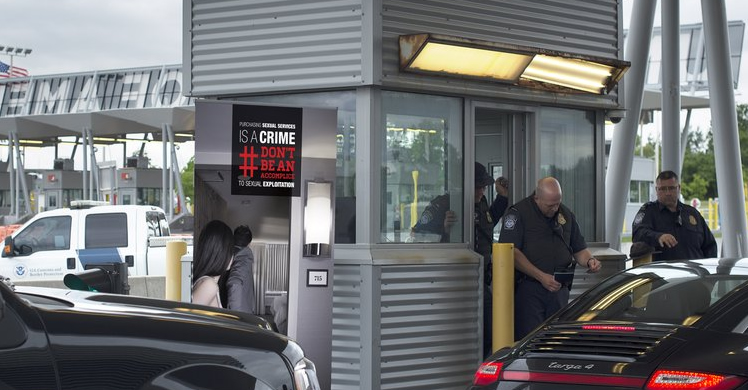Archived Content
In an effort to keep ICE.gov current, the archive contains content from a previous administration or is otherwise outdated. This information is archived and not reflective of current practice.
ICE partners with the Royal Canadian Mounted Police to combat human trafficking
A quick glance at the Grand Prix Montréal’s website will tell you everything you need to know about what happened in Canada’s second largest city the weekend of June 10.
The Formula One Grand Prix Du Canada was the marquee event. However, before the participants took to the track for the single-seat auto race on Sunday, June 12, thousands of local residents, visitors and Formula One fans in attendance had access to parties, shopping and numerous other events making Montréal the place to be during Grand Prix weekend.
Whether it’s a Formula One race, or any other major sporting event or even a business convention, host cities often find that additional, unaffiliated events are planned at the same time in order to cater to the events’ expansive audiences. These can include criminal activity. And for every pre- or post-event party or official activity sponsored by the host event, there are likely other activities that are not nearly as publicized, but yet demanded.
In Montréal, the Royal Canadian Mounted Police (RCMP) expected that the influx of visitors throughout the week leading up the race could increase the demand for sexual services. On Monday, June 6, RCMP officers and the Montréal Police launched a sexual exploitation awareness campaign among local residents, visitors and foreign travelers. The initiative was conducted in partnership with several law enforcement agencies, including U.S. Immigration and Customs Enforcement’s (ICE) Homeland Security Investigations (HSI). The objective of the campaign was to remind the public that the purchase of sexual services is a crime and by doing so, they’re contributing to financing sexual exploitation networks.
“We wanted to bring this to the attention of everyday people and make them realize that laws have changed and the focus is now more on the consumer rather than the woman selling services,” said Camille Habel, RCMP media liaison. “Even if it’s just a one-time thing, it’s still a crime and there’s a bigger problem going on.”
The RCMP took to Facebook and Twitter using the hashtag #DontBeAnAccomplice to anchor its week-long campaign against sexual exploitation. Messages such as, “Sexual exploitation is a form of human trafficking. Close to 40% of the victims are minors,” and, “A number of victims of human trafficking are exploited through prostitution in strip clubs or escort services,” served as reminders that purchasing sexual services is a crime.
Human trafficking is one of the most heinous crimes investigated by ICE. In its worst manifestation, human trafficking is akin to modern-day slavery. Sex trafficking occurs when a commercial sex act is induced by force, fraud or coercion, or in which the person induced to perform such act has not attained 18 years of age. It includes the recruitment, harboring, transportation, provision or obtaining of a person for labor or services, through the use of force, fraud or coercion for the purpose of subjection to involuntary servitude, peonage, debt bondage or slavery.
According to Habel, the goal of the campaign was to raise awareness of human sex trafficking and increase discussions about its dangers.
The RCMP’s partnership with HSI and other agencies such as U.S. Customs and Border Protection and the United States Border Patrol was both initiative-based and operational. The agencies’ presence increased throughout the week at various strategic locations in an effort to curb this criminal activity.
HSI was on board with the RCMP’s public relations department to support the campaign since Day 1. HSI subject matter experts on human trafficking supported the RCMP throughout the entire operation in Montreal and at the U.S. border as situations developed.
“When Montréal experiences an event of this magnitude that draws this many people to the city, being proactive about fighting sex trafficking is a very demanding task for all of our law enforcement partners,” Hatfield said. “We did what we could, both within the city and at the ports of entry, to try and identify people who are coming to Montréal for that purpose.”
ICE recognizes that severe consequences of human trafficking continue even after the perpetrators have been arrested and held accountable. ICE’s Victim Assistance Program helps coordinate services to help human trafficking victims, such as crisis intervention, counseling and emotional support.


